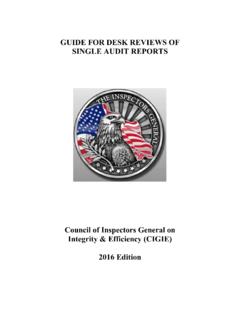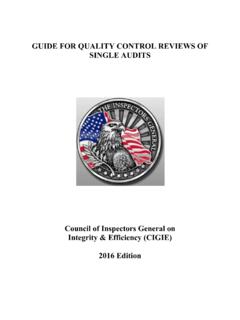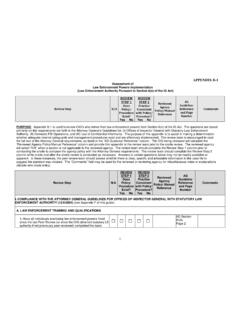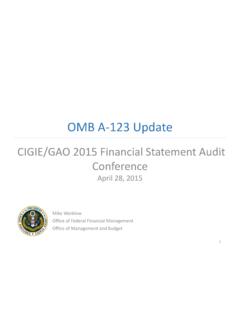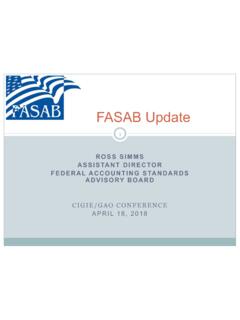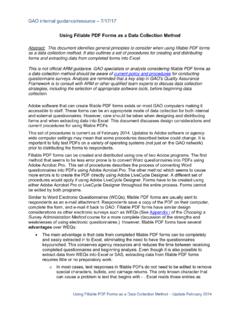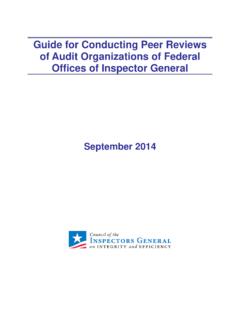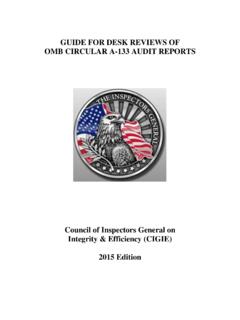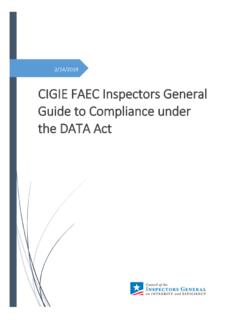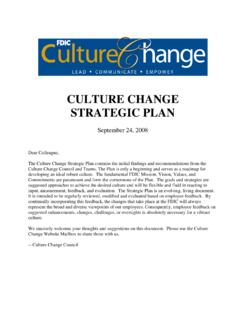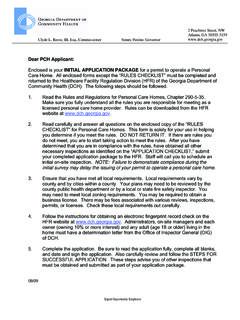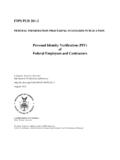Transcription of Quuaalliittyy dSSttaannddaarrdss foorr Fe edd er ra all ...
1 Quality Standards fo r Federal Offices of Inspector General Council of the Inspectors General on Integrity and Efficiency August 2012. Foreword In anticipation of the fourth anniversary of the creation of the Council of the Inspectors General on Integrity and Efficiency (CIGIE), its members have updated the Quality Standards for Federal Offices of Inspector General. The standards in the Silver Book set forth the overall quality framework for managing, operating, and conducting the work of Offices of Inspector General and will guide the Inspector General Community's efforts into the future. The Honorable Phyllis K. Fong Mr. Carl A. Clinefelter Chairperson, CIGIE Vice Chairperson, CIGIE. Contents I. Introduction 3. A. Purpose 3. B. OIG Mission 4. C. Relationship to Federal Legislation and regulations , and Federal and Professional Standards 5.
2 II. Ethics, Independence, and Confidentiality 7. A. General Standard 7. B. Standards for Ethical Conduct for Employees of the Executive Branch 8. C. Independence 10. D. Confidentiality 17. III. Professional Standards 19. A. General Standard 19. IV. Ensuring Internal Control 20. A. General Standard 20. B. Efficient and Effective Operations 20. C. Control Environment 21. D. Risk Assessment 21. E. Control Activities 22. F. Information and Communication 22. G. Monitoring 22. V. Maintaining Quality Assurance 25. A. General Standard 25. B. Quality Assurance Program 25. C. Elements of an Internal Quality Assurance Program 26. D. Elements of an External Quality Assurance Program 27. VI. Planning and Coordinating 30. A. General Standard 30. B. Elements of the Planning Process 31. C. Coordination Considerations 32.
3 D. Prevention 34. VII. Communicating Results of OIG Activities 35. A. General Standard 35. B. Keeping the Head of the Agency Informed 35. C. Keeping the Congress Informed 36. D. Keeping the Congress and Agency Informed on Performance 37. E. Keeping Program Managers Informed 37. F. Keeping Ethics Officials Informed 38. G. Keeping the Attorney General Informed 38. H. Keeping the Public Informed 38. I. Elements of Effective Reporting 39. VIII. Managing Human Capital 40. A. General Standard 40. B. Human Capital Processes 40. C. Core Competencies 40. D. Skills Assessment 41. IX. Reviewing Legislation and regulations 42. A. General Standard 42. B. Elements of Legislative and Regulatory Review 42. X. Receiving and Reviewing Allegations 44. A. General Standard 44. B. Elements of a System for Receiving and Reviewing Allegations 44.
4 C. Feedback 45. Appendix I 46-56. Legislation, Executive Orders, Standards, and OMB and Other Guidance Impacting the Inspector General Community Appendix II 57. Members of the CIGIE Professional Development Committee Who Participated in Revising the Quality Standards for Federal Offices of Inspector General 2 Quality Standards Quality Standards for Federal Offices of Inspector General I. Introduction A. Purpose This document contains quality standards for the management, operation, and conduct of the Federal Offices of Inspector General (OIG). Executive Order 12805 gave the President's Council on Integrity and Efficiency (PCIE) and the Executive Council on Integrity and Efficiency (ECIE)1 the responsibility for developing professional standards for The Inspector General Reform Act of 2008 (IG Reform Act) created the Council of the Inspectors General on Integrity and Efficiency (CIGIE), which combined the PCIE and ECIE into a single The members of CIGIE have formulated and adopted these standards.
5 They are for OIG use to guide the conduct of official duties in a professional manner. These standards incorporate by reference the existing professional standards for audit, investigation , and inspection and evaluation efforts. Public office carries with it a responsibility to apply and account for the use of public resources economically, 1. Executive Order 12805, dated May 11, 1992, updated the charter for the President's Council on Integrity and Efficiency and created the Executive Council on Integrity and Efficiency. 2. Executive Order 12805, Section 3(c), states that individual members of the Councils should, to the extent permitted under law, adhere to professional standards developed by the Councils. This section gives the Councils the authority to establish standards for quality.
6 3. 5 app. 3 11. 2012 Revision 3. efficiently, and The OIGs have a special need for high standards of professionalism and integrity in light of the mission of the Inspectors General under the Because of this special need, the CIGIE has adopted the general quality standards contained in this document. B. OIG Mission OIGs have responsibility to report on current performance and accountability and to foster sound program management to help ensure effective government operations. The Inspector General Act of 1978, as amended (IG Act), created the OIGs to:6. 1. Conduct, supervise, and coordinate audits and investigations relating to the programs and operations of their agencies;. 2. Review existing and proposed legislation and regulations to make recommendations concerning the impact of such legislation and regulations on economy and efficiency or the prevention and detection of fraud and abuse.
7 4. The Standards for Internal Control in the Federal Government, published by the General Accounting Office (GAO) in November 1999, require that Management and employees should establish and maintain an environment throughout the organization that sets a positive and supportive attitude toward internal control and conscientious management. The Internal Control Standards define internal control as an integral component of an organization's management that provides reasonable assurance that the following objectives are being achieved: (1) effectiveness and efficiency of operations, (2) reliability of financial reporting, and (3) compliance with applicable laws and regulations . 5. The IG Act (Public Law 95-452), Section 2, established independent and objective units to review agency activities.
8 6. 5 app. 3 2 and 4. 4 Quality Standards 3. Provide leadership for activities designed to promote economy, efficiency, and effectiveness, and to promote efforts to reduce fraud, waste, and abuse in the programs and operations of their agencies;. 4. Coordinate relationships between the agency and other Federal agencies, State and local government agencies, and non-government agencies to promote economy and efficiency, to prevent and detect fraud and abuse, or to identify and prosecute participants engaged in fraud or abuse;. 5. Inform their agency heads and Congress of problems in their agencies' programs and operations and the necessity for and progress of corrective actions; and 6. Report to the Attorney General whenever the Inspector General has reasonable grounds to believe there has been a violation of Federal criminal law.
9 In addition to audits and investigations referenced above, OIGs may conduct, supervise, and coordinate inspections, evaluations, and other reviews related to the programs and operations of their departments and agencies. The IG Reform Act recognized the longstanding practice of the IG community to also conduct inspections and C. Relationship to Federal Laws and regulations , and Federal and Professional Standards OIG operations are subject to a variety of Federal laws and regulations , and Federal and other professional standards, such as the IG Act, Single Audit Act, Standards of Ethical Conduct for Employees of the Executive Branch, the Government 7. 5 app. 3 11(b), (c). 2012 Revision 5. Auditing Standards, the CIGIE Quality Standards for Inspection and Evaluation, and the CIGIE Quality Standards for Investigations.
10 The standards contained in this document are derived from these and other requirements. These standards, however, are not intended to contradict or supersede applicable standards or Federal laws and regulations . See Appendix I for a list of major laws, regulations , and standards that apply to OIGs. An OIG may be a component of an entity that is not legally defined as a Federal agency. For this, or other reasons, certain laws, regulations , or other guidance cited in this document may not be directly applicable to certain OIGs. Where a standard contained in this document is premised on law or other criteria not directly applicable to an OIG, OIGs are encouraged to adopt the underlying principles and concepts to their operations where appropriate and feasible. 6 Quality Standards II. Ethics, Independence, and Confidentiality A.
